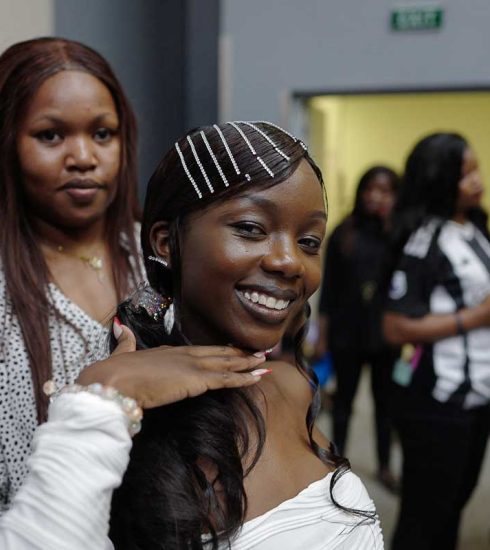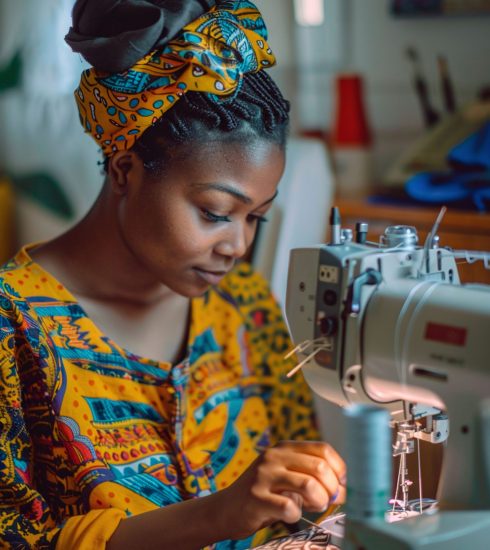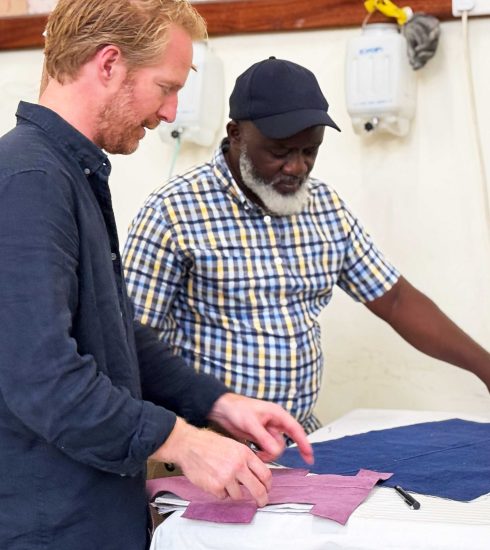- Fesheni Africa
- July 11, 2025
Eco Fashion Week Africa (EFWA) is Africa’s pioneering zero-waste fashion movement. In many African homes, upcycling was never a trend but a necessity. Today, it is our superpower.
EFWA challenges the fast fashion model by uplifting our continent’s legacy of repair, reuse, and repurpose. We host week-long, community-led workshops, panel discussions, and fashion events with one unshakable theme: the “No New Clothes Runway.” Through this, we celebrate designs born from waste, secondhand materials, and forgotten fabrics reimagined by designers across the continent.
Our growing impact includes collaborations with UNEP, participation in global platforms like Circular Sustainable Fashion Week Madrid, and recognition by Forbes Africa. We are also proud members of the UN Fashion and Lifestyle Network, further anchoring our global relevance. What sets us apart is what we disrupt, the idea that Africa is behind. EFWA reveals that Africa is ahead, and the world is finally catching on.
The Birth of EFWA Africa
About the Founders
Belinda Atieno and Ruth Anyango are two visionaries bound by a shared mission to reframe African fashion through a regenerative lens.
Belinda is a sustainability advocate, creative director, and co-founder of EFWA. Her journey is rooted in lived experience growing up in a community where repurposing was culture, not concept. She transformed this truth into a global movement, bridging grassroots innovation with international platforms. Beyond EFWA, she leads initiatives in eco-conscious branding, sustainability consulting, and hospitality, serving as Head of PR and Sustainability at Babylon Hospitality and founder of The White Shop Malindi.
Ruth Anyango, known widely as Doli The Seamstress, is a force in Kenya’s slow fashion movement. A master tailor and storyteller, her work amplifies the value of mending and the stories sewn into every garment. As co-founder of EFWA, she anchors the movement in authenticity and cultural preservation, empowering communities through skill-building and conscious design.
Together, they are cultural custodians redefining Fashion Weeks’ future.
Sustainable Fashion in Kenya: The Role of Fashion Weeks
In a world where fashion weeks are a reason to produce more with runways increasingly saturated by fast fashion and fleeting trends, Eco Fashion Week Africa is a bold intervention. It has emerged as a disruptive force that celebrates what was once dismissed and to use the fashion week as an excuse to clean up the environment and create awareness.
Our “No New Clothes Runway” is a statement of resistance. We uplift circularity, not as a borrowed concept, but as a return to our African roots where nothing was wasted and everything had value.
Since our launch, EFWA has inspired designers, events, and institutions across Kenya to reconsider what fashion means. We’ve witnessed a shift! Mainstream platforms now echo circular principles we pioneered. That is the power of being rooted. We are not catching up to the world; the world is catching up to us.
Community Impact
EFWA is built with and for the community. Our events are hosted in accessible, culturally resonant spaces. From creative hubs to schools and community grounds. We offer workshops for women, youth, and emerging designers, teaching upcycling, sustainable design, and fashion entrepreneurship.
Our mentorship programs bridge gaps in access, connecting grassroots designers with industry professionals, and our partnerships such as with UNEP amplifies our impact beyond fashion into environmental education and behavioral change.
Challenges
Like many grassroots movements, we face structural and financial barriers. Securing consistent funding and long-term monetary partners remains a challenge. While our ideas are compelling, the fashion industry still tends to reward spectacle over substance.
But perhaps our biggest challenge is navigating a system that historically excluded our ways of knowing. Sustainable practices rooted in African tradition are often overlooked unless repackaged through Western frameworks. We are reclaiming that narrative.
The Future of Eco Fashion Week Africa
Looking ahead, EFWA is expanding regionally across Africa. Our dream is to create a network of localized fashion weeks that celebrate regenerative practices across the continent. From West African dyeing techniques to Southern and Eastern African beadwork.
We are nurturing the next generation through mentorship programs, spotlighting young designers who innovate with waste, and building bridges with global institutions committed to sustainability. Our long-term vision is to normalize sustainability not as an exception, but as the African default.
Defining Sustainability and the Business of Eco-Fashion
To me, sustainability means living in rhythm with the earth and each other. It’s not a new ideal, it’s an ancient African way of life. It means considering the full life cycle of everything we consume, from who made it to where it ends up.
On Achieving Sustainability at EFWA
At EFWA, we live by this definition. From curating zero-waste shows to spotlighting designers who turn waste into wearable art. Belinda also extends this to her business, stocking upcycled and ethical brands at The White Shop Malindi, a fashion and lifestyle boutique grounded in conscious living.
Our next step is to deepen local supply chains. We’re currently working to empower rural tailors, creating dignified, circular livelihoods. We’re also exploring digital platforms to showcase African innovation in sustainability on our own terms.
On Transitioning to a Sustainable Brand
To become truly sustainable, a brand must unlearn convenience and re-learn care. It starts with asking: who made this? At what cost? Where does it go next? The transition isn’t about perfection; it’s about progress with purpose.
On Whether Sustainable Fashion is a Sustainable Business
Yes. But only when value is redefined. Sustainable fashion may not promise fast profit, but it offers lasting impact. It builds community, honors heritage, and prioritizes planet over trend. That is a different kind of wealth
Policy Advocacy in Fashion Sustainability
I strongly advocate for policies that support eco-conscious brands. We need legislation that:
- Provides grants and tax incentives for sustainable businesses.
- Regulates fashion waste and imports.
- Encourages ethical labor and fair pay.
At the same time, existing policies like taxing eco-friendly fabrics or ignoring textile waste from imports hinder progress. If we want a regenerative fashion system, policy must reflect that ambition.
The Legacy of Eco Fashion Week Africa
We want it to be a turning point. A cultural compass!
In five years, we envision EFWA as a continent-wide movement with editions in multiple African cities, each showcasing local circular fashion narratives. We see it as a platform that has helped hundreds of designers become sustainable brand leaders, and a space where African fashion is valued not for how closely it mimics the West but for how boldly it reflects home.
Our legacy will be clear: Africa never needed to catch up. We simply needed to remember who we are.







